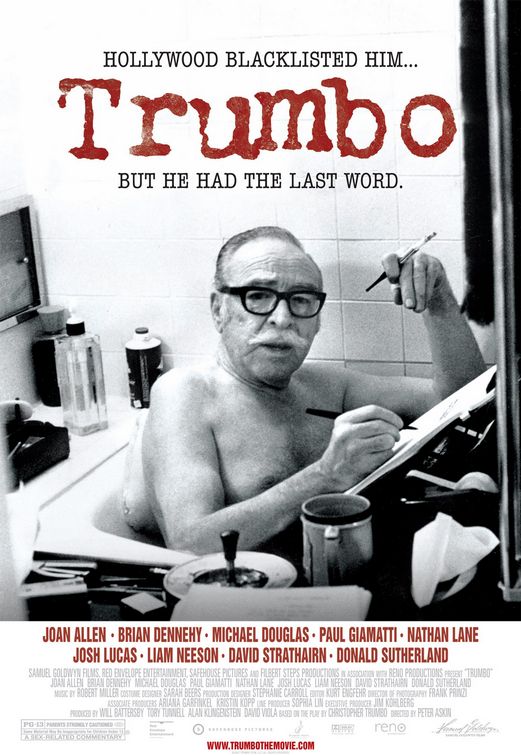“Communist Distortion of History”

| None | Light | Moderate | Heavy | |
|---|---|---|---|---|
| Language | ||||
| Violence | ||||
| Sex | ||||
| Nudity |
What You Need To Know:
Though well-produced, TRUMBO is a propaganda piece that presents a very strong, deceitful, humanist, and pro-Communist worldview with little effort to present the other side. It also contains brief foul language and brief sexual discussion. For some truth about the Hollywood blacklist, MOVIEGUIDE® recommends the book HOLLYWOOD PARTY by Kevin Lloyd Billinglsey. The book reveals Trumbo’s efforts as a Communist Party hack who usually trumpeted the Stalinist Communist line.
Content:
(HHH, CoCoCo, RHRHRH, APAPAP, B, L, S, A, D, MMM) Very strong humanist, Communist worldview with very strong revisionist history that’s anti-American, plus some light moral elements; three obscenities; no violence; implied sexual immorality relating to vulgar description of self abuse; no nudity; brief use of alcohol; brief smoking; and, overall movie is deceitful with little effort made to present the other side of the story or let the other side speak other than some anti-Communist statements from Communist opponents in the United States.
More Detail:
TRUMBO is based on a collection of Trumbo’s letters written over a two decade period. The movie states that the blacklist era was “a time of evil” and that the “evil touched everyone.” Although a staunch Communist activist who parroted the Party line during his heydey in Hollywood, Trumbo later said that good and evil was done on both sides of the blacklist issue, according to HOLLYWOOD PARTY (page 265). The movie, of course, doesn’t use that particular quote.
Trumbo’s letters reflect his thoughts on the time and the effect on people. His letters are conversations with those close to him, and allow viewers to understand him as a man and not just a writer.
Among the letters are intimate recollections such as his daughter remembering Trumbo as a cantankerous man who never managed to save any money. However, two letters to his wife depict him as a loving man, who above all else put his family’s need above his own. The first such letter came from prison in 1951 in which Trumbo wrote a poem for his son’s 11th birthday, reminiscing about his joys of fatherhood. The next letter came about 1957 to his daughter’s teacher regarding the effect of “patriotic meetings sponsored by the PTA” and his concerns on his daughter psychological well-being.
Trumbo described the producers who cooperated with the blacklist as men who “enforce economic lash that stings, and places upon the flag moral atrocities that he [the producer] should blame upon himself.” TRUMBO attempts to turn the American concept of democracy in the 1940s on its head by saying that, although the First Amendment was the basic law of the country, it was problematic because it forced individuals to make difficult choices. The movie says that if a man violated his principles, he would be rich. If he clung to his principles, he would become less of a man. Dalton further says that the blacklist represented a “choice between enough food and shelter for his wife and children and the First Amendment.” Dalton says that he “[went] for food, shelter and necessity, [while] freedom of speech is a necessity that few fight for.”
Ironically according to HOLLYWOOD PARTY, although during his Communist Party days Trumbo “thought of himself as a proletarian wage-slave” (page 82) for the studios, he was the highest-paid writer in Hollywood and enjoyed his luxury (page 82). In other words, Trumbo acted hypocritically during his heydey in Hollywood, when he and other Communist Party hacks tried to put snippets of Stalinist Communist doctrine from the Soviet Union into the movies they made for the studios.
Although TRUMBO hints that Dalton was bitter about the blacklist, Dalton says that he believed the verdict was just because he did have contempt for that court and instead chose to ”maneuver his way around the blacklist through pseudonyms.” Between 1947 and 1960, he accumulated thirteen pseudonyms under which he maintained a living as a writer. Contrary to the revisionist history of this movie and many other, most of the Communists kept writing under pseudonyms while the patriots such as Robert Taylor and Robert Allen were locked out of the studios or eventually erased from the history of Hollywood. Finally in 1960, Dalton received his true name credit from Otto Preminger and Kirk Douglas for EXODUS and SPARTACUS.
TRUMBO concludes with Dalton saying that the Declaration of Independence does not guarantee that its citizens will be happy, but that they have the right to pursue happiness. He also says, “Life was a series of battles. . . [but ] he [was] a citizen no less peaceful than his neighbors.”
TRUMBO is a well produced documentary with a star-studded list of celebrities discussing Trumbo’s life and impact including Kirk Douglas, Michael Douglas, Danny Glover, Nathan Lane, Donald Sutherland and Brian Dennehy. However, the movie’s pro-Communist worldview, historical revisionism and twisted sense of freedom and responsibility make TRUMBO more of a work of propaganda than a work of truth, much less a work celebrating Justice and the American Way.


 - Content:
- Content: 

